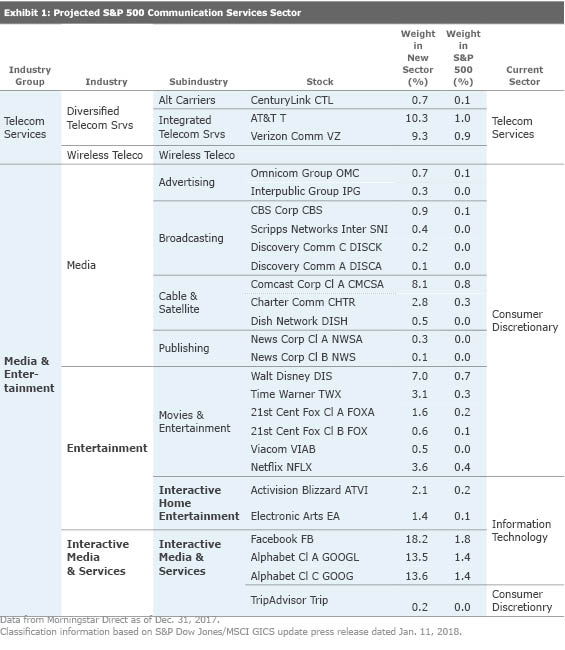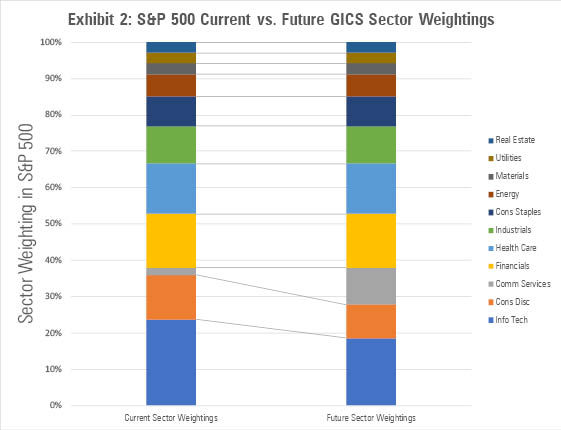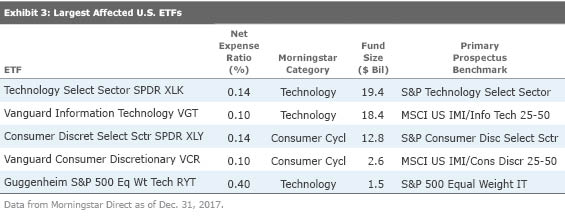How Will the GICS Sector Changes Affect Your Sector ETFs?
The renamed communication services sector will combine select technology and consumer discretionary stocks with current telecommunication services names.
In November 2017, S&P Dow Jones and MSCI (SPDJI/MSCI) announced that the Global Industry Classification Standard, or GICS, telecommunication services sector would be broadened and renamed "communication services." The communication services sector will add select media, entertainment, and consumer Internet stocks from the consumer discretionary and information technology sectors to its current telecommunication services constituents.
In mid-January 2018, SPDJI/MSCI released a list of the largest companies affected by the GICS update. SPDJI/MSCI plans to release a full list of affected securities on July 2, 2018, and provide a finalized list of affected securities on Sept. 3, 2018, before the GICS update takes effect after the market closes on Friday, Sept. 28, 2018. This classification change will impact index funds that focus on the telecommunications, information technology, and consumer discretionary sectors.
Musical Chairs
Based on SPDJI/MSCI's updated press release, the S&P 500's communication services sector is set to add 19 new companies alongside

The communication services sector adds media-focused stocks from the consumer discretionary sector and information technology stocks that create or distribute content through proprietary platforms to the current telecom services lineup. SPDJI/MSCI explains that categorizing these stocks together "is a step toward acknowledging the convergence of telecommunications, media, and select Internet companies and overlapping services rendered by these companies, within the GICS structure."
I agree with SPDJI/MSCI that a new classification makes sense, but investors should be aware that these changes will significantly alter the composition of the current telecommunication services sector, making it considerably broader and less defensive. For example, the new S&P 500 communication services sector's beta with the S&P 500 (a measure of market sensitivity) would have measured 1.0 during the trailing three years through December 2017, while the current S&P 500 telecommunication services sector's beta measured 0.6 during that time frame. This is because media and content distributors tend to be more cyclical than traditional phone companies, like Verizon. Also, the current telecommunication services' forward dividend yield measured 4.9% as of Dec. 31, 2017, compared with a 1.4% forward dividend yield for the proposed communication services sector.
Red Rover, Red Rover Send Facebook Right Over
Notable stock migrations from the information technology sector include
Based on market capitalizations at the end of December 2017, the communication services sector will represent about 10.2% of the S&P 500. In addition to the current telecom services stocks (these represent 2.2% of the S&P 500), the updated sector will draw names from the consumer discretionary and information technology sectors that represent about 3.1% and 5.1%, respectively, of the S&P 500. Exhibit 2 shows how the S&P 500 sector weightings will change based on market cap as of Dec. 31, 2017.

Holdings data from Morningstar Direct as of Dec. 31, 2017. Future Sector Weightings assume that S&P 500 constituents do not change.
These sector changes help reduce sector concentration within the S&P 500. The five largest sectors currently represent nearly three quarters of the S&P 500's market cap. After the announced GICS sector changes, the top five sectors will represent about two thirds of the S&P 500's market cap.
What Do I Need To Do?
For most broadly diversified equity funds, this GICS reclassification is simply a relabeling exercise, but there could be implications for investors in sector-focused funds. State Street Global Advisors' (SSGA)
To represent the newly created communication services sector, SSGA will have to add stocks carved out from the consumer discretionary sector to XLK or create a separate communication services sector exchange-traded fund by carving out communication services sector stocks from XLK and
Vanguard does not include telecommunication services stocks in
Sector funds that do not use GICS classifications will not be affected. For example, BlackRock's iShares sector funds track Dow Jones sector indexes and will not be immediately affected by the GICS update. Consequently,

Understand the Implications for Your Holdings SPDJI/MSCI incorporates the investment community's feedback during its annual GICS review and provides a long lead time ahead of potential changes so investors have time to react. Investors who hold affected funds should understand the implications of the upcoming GICS changes, decide if they agree with the reclassifications, and either keep or swap their sector funds to express their investment views.

Disclosure: Morningstar, Inc. licenses indexes to financial institutions as the tracking indexes for investable products, such as exchange-traded funds, sponsored by the financial institution. The license fee for such use is paid by the sponsoring financial institution based mainly on the total assets of the investable product. Please click
for a list of investable products that track or have tracked a Morningstar index. Neither Morningstar, Inc. nor its investment management division markets,
or makes any representations regarding the advisability of investing in any investable product that tracks a Morningstar index.

/s3.amazonaws.com/arc-authors/morningstar/64dafa24-41b3-4a5e-aade-5d471358063f.jpg)
/cloudfront-us-east-1.images.arcpublishing.com/morningstar/T2LGZCEHBZBJJPPKHO7Y4EEKSM.png)
/d10o6nnig0wrdw.cloudfront.net/04-18-2024/t_34ccafe52c7c46979f1073e515ef92d4_name_file_960x540_1600_v4_.jpg)
/d10o6nnig0wrdw.cloudfront.net/04-09-2024/t_e87d9a06e6904d6f97765a0784117913_name_file_960x540_1600_v4_.jpg)
:quality(80)/s3.amazonaws.com/arc-authors/morningstar/64dafa24-41b3-4a5e-aade-5d471358063f.jpg)